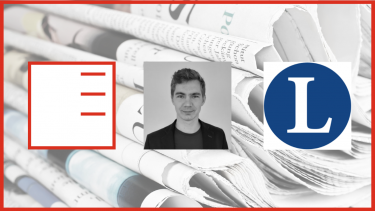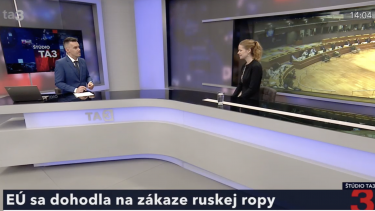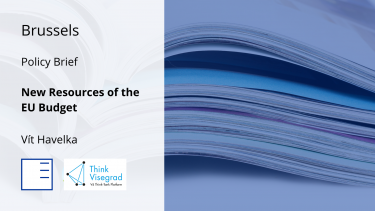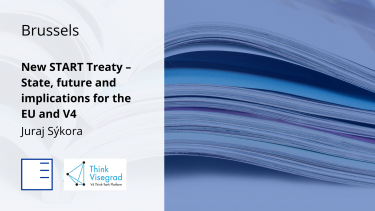Lidovky.cz: The exception to the embargo is a birthday present for Orban, says a researcher at the Europeum think-tank
Our research fellow Michal Hrubý gave an interview to Lidovky.cz on the topic of oil imports to Europe and exceptions to the embargo. In the interview, he also describes the compromises in the negotiations on the form of the embargo.
Show moreStudio TA3: The European Union has agreed on a partial ban on Russian oil. How will this affect the Slovak economy?
Our Associate Research Fellow Zuzana Stuchlíková gave an interview for Slovak TV TA3. Zuzana Stuchlíková talks about the process of approving the latest EU sanctions package against Russia and the ban on Russian oil imports. She discusses how the negotiations went, how the exemptions for Central Europe will work, what it means for fuel prices and what will happen next.
Show more
Policy Brief: New Resources of the EU Budget
Our researcher Vít Havelka, in his article "New Sources of the EU Budget", which was created under the Think Visegrad in Brussels project, writes about the new own resources of the EU budget, which are currently being discussed at the European level. The text specifically discusses why the reform of own resources is necessary and what are the positions of the various EU institutions and member states on these proposals. It concludes with a reflection on the Czech position, including an outlook on how it might evolve depending on the course of the negotiations.
Show more
Policy Paper: Time to Redefine the Terms and Conditions of the Transatlantic Relationship? – 2021 Transatlantic Policy Forum in Review
On November 18-19, 2021, the fourth edition of the Transatlantic Policy Forum took place. It was hosted by EUROPEUM Institute for European Policy in partnership with the German Marshall Fund of the United States and the International Republican Institute (IRI), supported by the International Visegrad Fund, Friedrich Naumann Foundation, and the Ministry of Foreign Affairs of the Czech Republic. The aim of this Policy Paper is to provide a summary and analysis of the discussions that took place, while respecting the Chatham House rule and thus preserving the anonymity of the participants. This analysis aims to highlight and elaborate on the main findings of the participants.
Show more
SWP: Between change and continuity: European expectations towards Czech and German EU policies after the 2021 elections
For the German Institute for International and Security Affairs, Žiga Faktor, Director of our Brussels office, and Zuzana Stuchlíková, Research Associate at EUROPEUM Institute for European Policy, co-authored an article on the European expectations of the Czech and German governments' European policy.
Show more PDF

INFO.CZ: The world is slowly moving towards a carbon-free economy. The Glasgow Climate Conference showed that the EU has strong climate allies
It's no longer if, but how. Kateřina Davidová in a commentary for INFO.CZ describes the results of the climate conference in Glasgow. She evaluated international cooperation and negotiations between the "rich" world and developing countries.
Show more
ČRo plus: Joe Biden's negotiations with Emmanuel Macron after the French-American diplomatic row and their further cooperation
Zdeněk Beránek, director of the EUROPEUM Institute for European Policy, spoke to Czech Radio about Joe Biden's European tour and his meeting with Emmanuel Macron for the first time since the diplomatic row over the cancelled delivery of French submarines to Australia. He explained what the agenda of their meeting was, i.e. how this row has affected French-American relations, but also how cooperation is taking place in the light of the rise of China, or on the topics of economic recovery and climate change.
Show more
Policy Paper: New START Treaty – State, future and implications for the EU and V4
In his policy paper "New START Treaty – State, future and implications for the EU and V4", written in cooperation with the Think Visegrad think tank, Juraj Sýkora, a Junior Researcher at SFPA, analyses the current state of nuclear arms control, the New START Treaty, what it contains and who it concerns. The policy paper also analyses the prospects until 2026, when the extension of the Treaty expires.
Show more PDFiRozhlas: The new government means the end of the leaning towards Orbán, but not a radical change. The EU presidency will be crucial
In an article for iRozhlas, our researcher Vít Havelka contributed an analysis of European politics in the context of the new government, the Visegrad Group and the upcoming EU presidency. In his opinion, there will be a radical change in the rhetoric and the way of negotiation on the European stage, but we cannot expect big differences in the Czech vote.
Show more
Radio Z: Hundreds of Middle Eastern migrants detained in Germany near the border with Poland in recent days, they entered the EU via Belarus
Martin Vokálek, Executive Director of the EUROPEUM Institute for European Policy, commented on current events on the Belarus-Polish border. Precisely because of migration, Poland extended the state of emergency on the border with Belarus. The problem will be discussed by the European Parliament.
Show more
Staroměstské náměstí 4/1
Prague 1 - Staré Město
110 00
tel.: +420 212 246 552
email: europeum@europeum.org
https://www.europeum.org









